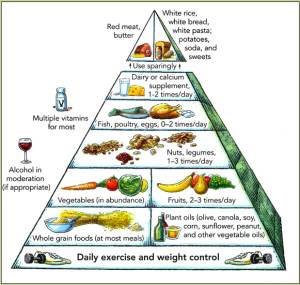Well Balanced Diet
Cracking the Insulin Riddle
Written by Dr. L. Lee Coyne, the Healthy Professor
 How many times have you been told “all you need is a well balanced diet” or “everything in moderation” are the best methods of weight management.
How many times have you been told “all you need is a well balanced diet” or “everything in moderation” are the best methods of weight management.
Well if you choose the “well balanced diet approach, which balance do you choose?
Should it be the 60-20-20 balance of many sports nutrition “experts” or the 60-15-20 balance of the Canada Food guide variety, or the 75-15-10 guidelines of the Dr. Ornish followers or the 40-30-30 plan found in the Zone and the Fit Start programs.
The first number is % of calories from carbohydrate, the second is the % protein and the third number is the % of fat in each meal.
If you choose the “everything in moderation” approach, do you include alcohol, tobacco, soft drinks and trans fatty acid laden deep fried food? I consider this approach to be a “cop-out” for those not willing to take the time to learn the latest and wisest approaches to better health.
The latest research on this subject may surprise you. As North Americans have been convinced, over the last 45 years, that fat is bad and we should avoid it at all costs, the relative daily consumption of fat has dropped from 50% of Calories to a new low of 32% of Calories.
Yet, in spite of this dramatic dietary shift to low fat – no fat products, we find the incidence of obesity doubling every 5 years. The latest data indicates that about 30% of the population is obese (70% are “overweight”) and this even applies to school age children. So, in short, low fat-no fat has not been working.
Many “authorities” attempt to push the blame over to the lack of exercise and suggesting we just don’t burn enough calories. However, although exercise is important and very necessary, there is no exercise program that will counterbalance the negative effects of a poor diet.
Fundamentally, the standard Canadian diet can be summarized as “Carbohydrate Hell creating Insulin Disasters” This means that most people eat too much sugar, refined carbohydrates and carbohydrates in general and this creates a condition of chronically elevated blood insulin levels and that in turn creates excess fat storage.
You see, insulin is the “storage” hormone. While insulin is elevated, in response to elevated carbohydrate intake or elevated blood sugar, fat will be stored and not burned.
Unfortunately most North Americans eat or drink something every two hours and it usually comes in the form of inexpensive carbohydrates in a bottle, box, package or a can.
A great title for a book would be “Control Your Insulin, Control Your Insulin, for Goodness Sake, Control Your Insulin”. Insulin is a “good-guy/bad guy”. You die without it but chronically elevated levels are responsible for fat storage, elevated cholesterol, hypoglycemia and inflammatory conditions like eczema, psoriasis, arthritis, asthma and migraines to name a few scenarios.
The disturbing thing about our current knowledge in this subject is that is has been known for years. Published work on the benefits of controlling carbohydrates, increasing protein consumption and ensuring adequate fat intake have been in the scientific literature for over 100 years.
Simple facts like: protein and fat control appetite whereas carbohydrates do not; or you need certain fats to burn the other fats; or cholesterol in food has nothing to do with cholesterol in the blood have all been known for years.
The recent surprising research I refer to is a study from Duke University, published in November of 2002, involving 120 heart disease patients over a six month period. Half the patients followed the standard low calorie low fat American Heart Association Phase I diet and the other half followed the 60% dietary fat, high protein Atkins diet.
The Study showed that the Atkins program reduced triglycerides, low density cholesterol and body weight significantly better than the standard approach. This is the third study of similar approaches and results to be presented and published in the past year.
You have to wonder when people and health practitioners will catch on. This so called new research is just confirming work done 35 or more years ago. Dr. John Yudkin of Queen Elizabeth College at the University of London in England reported in 1978, (approximately 35 years ago) “... results of all studies combined demonstrate a greater correlation between sugar intake and heart disease than between fat intake and heart disease.”
The results achieved by the participants in the Fit Start programs chronicled over the past year in this publication are consistent with the results of the Atkins studies and the Yudkin report. Still with all this evidence, there seems to be a reluctance among conventional health practitioners and the general public to buy into these successful concepts.
To help you shift your paradigm and experience some of the success of a program designed to control insulin, give you more energy, help to control your weight and just plain feel better we are offering an introductory two week “mini program”.